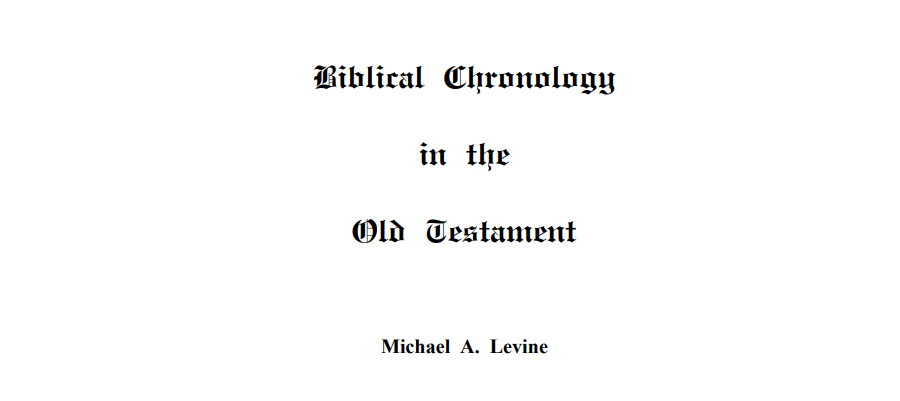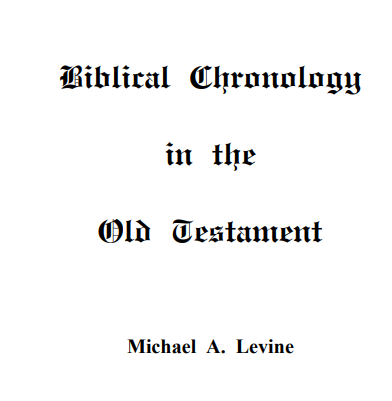
- Version
- Download 290
- File Size 24 MB
- Create Date November 1, 2017
- Download
Author: Michael A Levine
Preface:
I am not a scholar, of The Old Testament. I am a student. I became a
student, of the Old Testament, after I retired, from being an engineer. My
specialty, as an engineer, was infrared sensor design, and, testing. This
included: solid state physics (infrared detectors), geometrical optics (the
sensors, and, the test chambers), diffraction (to correct the theoretical designs,
of the real equipment), cryogenics (cooling for the sensors, and, the test
chamber), blackbody theory, design, and, calibration (to generate the calibrated
infrared signals), electronics (amplifiers, and, preamplifiers, for the calibration
sensor, inside of the test chamber), grounding systems (to minimize the
electrical noise, in the laboratories).
As you can imagine, this left no time, to study the Old Testament. The job
plus commuting plus lunch plus studying to stay current, in all these fields,
took, about, 80 hours, each week. So, it was, only, after I retired, that I
could embark on some long lost projects, that, I had put off, while, working.
One, of these projects, was to read the Old Testament, carefully, on my own,
to chart the genealogies, and, the chronologies. I had always been bothered,
by the conflict, between the scholarly work, of Ussher, which put creation in
the year 4004 BC, and, the Jewish Calendar, which puts creation in the year
3762 BC. The Jewish Calendar was organized by Hillel, in, about, 360 AD.
How could these two scholars have disagreed, by more than two centuries?
Rather than reading books, telling me what other scholars thought, of this
conflict, I preferred, to read the original material, first, keeping score, as I
went, and, only then, to see what others had concluded. So, this book is the
result of my own research. It is not a scholastic book report, on what others
have written. I bring to this project, only, my training, as a careful observer,
and, analyzer, of the data. I have often said, “Do not run from the data.”
Whatever is found, as reliable data, must be in accord, with the conclusions.
That has been my guide.
I do not have any particular hidden agenda, in this book. I call BC years
“BC” (Before Christ), rather than, “BCE” (Before the Common Era), because,
the original intent was to number the years, from the birth of Jesus, who was
perceived to be The Christ, and, because the word, “Common”, is a
prejudicial word denoting ignorance, and, vulgarity. Thus, both BC, and,
BCE, have a hidden agenda. I chose to use BC, for clarity, and, for no
other reason.
Similarly, I call the Old Testament, “The Old Testament”, rather than, “The
Holy Scriptures”, because, saying, “The Holy Scriptures”, implies that, The
New Testament is not holy, again, a prejudicial statement.
Also, “The New Testament” implies that, the Old Testament is not to be
believed, or, is out of date, or, is to be replaced, by the New Testament.
Once again, that terminology is based on a political agenda. I chose to use
“Old Testament”, for clarity only, and, for no other reason.
My original typewritten notes, took three years to assemble, before starting to
write this book. During that time, I spent about 40 hours a week studying,
analyzing, and, trying to put ideas onto paper. Many, of these ideas, are
new. Some, of the analysis techniques, may be new. I have been sternly
asked, “Well, how many scholars agree with you?” That is not the correct
question. That is like taking a popularity poll, rather than, analyzing the data.
So, I hope that you, the reader, will try to follow the logic of my analyses,
and, let the conclusions flow, to where, the data says, they should go.
If, you are a scholar, on Old Testament history, and, are offended, by my
attitude, as a mere student, then, let me remind you, that, a scholar is
someone, who has read virtually everything written, on a particular subject,
but, not necessarily, one, who has thought through each facet, of the subject,
from first principles, to the final conclusion. In fact, that is why, one
becomes a scholar. There is not enough time, in one life, to reason, from
the data, to the conclusions, for every facet, of a major subject. Conversely,
if, a student takes that time, in a limited area, then, he can become an
expert, though not a scholar, in that area.
In that sense, I hope, that, you will read my book, examine my data, and, my
conclusions, and, follow my many references, back to the original data, when,
you disagree, with my analysis.
